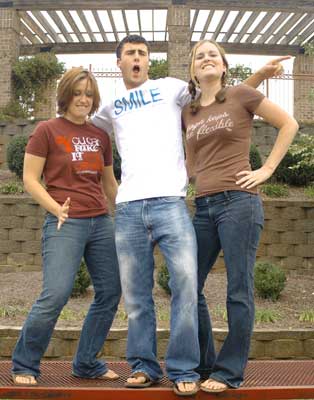“My name sounds great screamed.”
“Smile, it’s the second best thing you can do with your lips.”
“Will work forehand jobs.”
“Something about you attracts me. I wish I could put my finger on it.”
“Yawn so I can see if you’re the one.”
“You can fake it, but I can’t fake a relationship.”
Becky Leonard, associate communication professor and former facilitator of gender equity, said she can’t fake liking these, or other, Abercrombie and Fitch and Hollister “Humor Tees.” She said the humor tees imply “disrespect for yourself and for others.” Leonard said there is a difference between humor and “demeaning humor,” and Abercrombie and Fitch humor tees are demeaning.
“I enjoy humor T-shirts,” Leonard said. “But, I have a problem with demeaning humor.”
However, Tony Baracca said he thinks Abercrombie and Fitch doesn’t stick to just humor, whether it’s demeaning or not. “I don’t call the tees they sell ‘humor tees’ anymore,” Baracca, a senior in marketing and former Hollister employee, said. “They are not humor, but sexually related.”
Baracca, an Abercrombie and Fitch employee, said there has been a “distinct change” in the jokes on the “humor tees” since he began working at Abercrombie and Fitch.
Although Baracca doesn’t agree with the sexual content of the T-shirts, he said he loves working at Abercrombie and Fitch and that he wouldn’t have continued to work for the corporation if he didn’t.
With the “change” of the humor in the T-shirts, not everyone is a satisfied customer.
“They take it way too far,” Mallory Albert, a freshman in business management and former Abercrombie and Fitch employee, said.
The relevancy of the humor of the tees is just the beginning of the worries for Leonard.
“They made a decision that making money is more important than showing respect for customers,” Leonard said.
Albert said she agrees the company is disrespecting its clientele with the T-shirts.
She said she believes the company feels it is above making people angry, and no one is going ‘to get angry because oh my God! It’s Abercrombie and Fitch!'”
“It makes the people who wear the shirts look ridiculous,” Albert said.
Baracca would not comment on the way the shirts made the wearer appear. He said the shirts aren’t as bad as some people make them out to be.
“If people take [the “humor tees”] with a grain of salt, [they’re] less likely to be offended,” Baracca said.
The humor of the T-shirt is not the only concern. Abercrombie and Fitch’s most frequent customers are teenage girls, according to Albert. And influencing these young minds is a problem, Leonard said.
Leonard said what Abercrombie and Fitch does “disturbs” her, “particularly with young people” being their target audience.
Leonard said she is concerned mostly with the corporate culture Abercrombie and Fitch is endorsing: one that divides people by their social power and race.
According to her, Abercrombie and Fitch “tricks younger people into the corporation.”
Leonard said people need to understand Abercrombie and Fitch is a corporation that wants to make money, no matter what it takes.
Abercrombie and Fitch and Hollister are owned by a “very corporate company,” according to Baracca.
Abercrombie and Fitch is trying to do something different from their competition, and this method is “going into a place that is demeaning and offensive,” according to Leonard.
This different technique works. The humor tees draw in customers because they are intrigued and want to see them, according to Baracca. He said this was important for a company that does not advertise.
Leonard said she knows Abercrombie and Fitch advertises because she shows a clip from a film in her class that has an Abercrombie and Fitch advertisement. According to Leonard, the advertisement she shows is three people naked on an elephant with the same sexual undertones as some of the humor tees.
Even though everyone does not appreciate or agree with the humor tees, Baracca said he does not see a sign of change anywhere in the future.
“Ideas for change will never make it up the ladder,” he said.
Baracca said by working on the floor, he knows “what the people are looking for,” but the corporation does not listen to what he tells them.
“It”s not like they care,” Baracca said. “If there is a market, [Abercrombie and Fitch is] going to keep producing the product.”
Representatives from Abercrombie and Fitch were not available for comment after several attempts to reach them over the period of two days.








